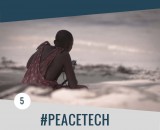Continuing Dialogue through Documentaries in Georgia
The lens of a documentary filmmaker has the potential to capture personal stories first-hand—something that frequently falls outside of the spotlight of mainstream media. Stories of ordinary persons, their fears, hopes, and their thoughts conveyed through the simple but powerful images of documentaries, offer intimate accounts of the lives of those affected by the conflict. This is perhaps the reason why coverage of conflicts through documentary films has been a popular instrument in re-building trust between conflict-affected communities in Georgia—a post-Soviet country in Eastern Europe that has suffered three major military conflicts on its territory since the breakup of the Soviet Union.
Stories of ordinary persons, their fears, hopes, and their thoughts conveyed through… documentaries, offer intimate accounts of the lives of those affected by the conflict.
In early 1990s, two autonomous regions of Georgia - Abkhazia and South Ossetia – seceded from Tbilisi. With the support of the Russian Federation and their ethnic kins in North Caucasus, Abkhaz and Ossetian militants were able to push out the Georgian army and formally declared their independence. Small-scale skirmishes and gun exchanges were a frequent occurrence in the aftermath of the conflict, mainly in areas of contested loyalty between Abkhazians and South Ossetians. One such skirmish in South Ossetia turned into a major military confrontation when the Russian Federation invaded Georgia and recognized the independence of its two regions. By claiming the lives of tens of thousands and displacing approximately 300,000, the wars have left an open wound in relations between the two communities that had once coexisted peacefully for centuries.
The Tbilisi-based Studio Re, a filmmaking media company has been an active campaigner in rebuilding the broken bridges between the Georgian, Ossetian, and Abkhaz societies since early days of the conflicts. Since its establishment in 1992, the studio has authored a number of documentary films on the conflicts and their consequences. Filmmakers at Studio Re team up with their counterparts from opposing banks even in the most turbulent times and, have not only demonstrated the possibility of successful cooperation but also ensured that the views of the opposing sides are available to all communities regardless of faction.
Perhaps the most successful of Studio Re productions, “Absence of Will” dates back to 2009, one year after the end of military hostilities between Russia and Georgia. The film features the story of two young Georgian university graduates – 20-year-old Teona Mchedlishvili and 21-year-old Vakhushti Menabde - who try to find the truth about the conflict in Abkhazia. In search of answers about the war that occurred early in their childhood, the two attempt to understand the reasons for hostilities by gathering accounts of those directly involved in the conflict - politicians, combatants, and locals from Abkhazia. While shooting the film, war broke out between Georgia and Russia, and what seemed so distant in their memories, unfolded before their eyes. Now instead of looking at the conflict solely from a historical perspective, Teo and Vakho are forced to find the truth about their own generation’s war as well.
The choice of youngsters as main characters of the documentary was not without reason; as the new generation they bear the burden of solving a conflict inherited from their predecessors. They also symbolize a different face of Georgia in the eyes of the world, a Georgia that wants to reassess its past in efforts to find viable solutions to the two-decade-old conflict. In the words of the film director Mamuka Kuparadze: “it is a fact that we are unable to solve the conflicts now and it is the new generation that should deal with this conflict. But as the first step, they should have a thorough understanding of the mistakes that both sides committed. For that purpose, we have recruited two youngsters – a girl and a boy – who were neither internally displaced from the two conflict regions, nor have any connection with politics. We gave them a task to start a research on why there is no solution of conflicts in Georgia. I was interested to see the problem with their eyes.”
“…as the new generation they bear the burden of solving a conflict inherited from their predecessors.”
Although the film was met with cautious reaction from politicians in Tbilisi it quickly received positive recognition internationally. Following its initial screening in Tbilisi, the documentary was shown to audiences in Istanbul, New York, London, The Hague, Vienna, Brussels, Amsterdam, Berlin, Monchengladbach, Moscow, and Stockholm.
What’s perhaps most significant, is that the film resonated on the other side of the conflict, with the Abkhaz audience. After a successful presentation in Istanbul, the film director was approached by a number of Abkhaz civil society leaders with a request to show the documentary to the audience in Abkhazia. The film screening took place in Sukhumi in June 2010 with the presence of the film director, which in itself was unprecedented considering the dynamics of Georgian-Abkhaz relations. The “Absence of Will” was also aired on Abkhaz state television but was later criticised by the Parliament of Abkhazia, on the grounds that it harmed the Abkhaz-Russian relations.
Despite the fact that the film has received mixed feedback from politicians in Tbilisi and Sukhumi, it has played a significant role in the continuation of dialogue between the Abkhaz and Georgian public. Perhaps the most important aspect about the film was the fact that, by featuring the new generation of Georgians eager to understand the roots of the conflict, the film introduced a new narrative to the stereotype-driven dynamics of Georgian-Abkhaz and Georgian-Ossetian relations.
(Feature Photo Credit: “WTF?” by Slava Murava Kiss, CC BY-NC 2.0).

